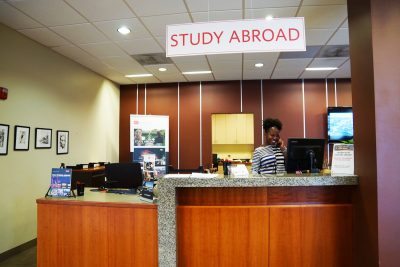
Boston University alumnus Sean Osner has worked for the United States Agency for International Development since 2008. Though Osner now works as the director of the Democracy, Human Rights and Governance Office in Jordan, he worked at USAID as the Representative for Niger from 2013-15.
Osner, who graduated in 1997, said that participating in BU’s study abroad program in Niger led him and other program participants to their careers at USAID and other influential organizations.
“The Study Abroad program was instrumental in shaping our careers,” Osner wrote in an email, “and the impact that that we are able to have today addressing some of the pressing needs of the world’s poorest country can be directly attributed to our early experiences in Niger on the BU Program.”
The program Osner participated in was created in part by Pardee School of Global Studies professor John Hutchison, who said he was inspired to create a partnership between BU and Abdou Moumouni University in Niger after teaching there for a year.
At first, the two universities exchanged faculty. Then, after a few years, they set up a program to let BU students study abroad in the African nation.
The idea for the program, proposed by Wheelock College of Education and Human Development professor Karen Boatman, was to create a study abroad program that combined cultural ideals from the College of Arts and Sciences’ African Studies program and educational ideals from Wheelock.
Hutchison added that Boatman believed it was important to bring students to parts of Africa that were struggling in order for the students to fully grasp the global issues facing the continent.
“She thought, ‘Why wouldn’t you want to bring American students to such an environment where the population has more challenges than anywhere else in the world?’” Hutchison said. “She wanted people to see what Africans are really facing.”
Unfortunately, Hutchison said, BU was never able to bring Nigerien students to study abroad at BU. The program had to end in 2011 after increasing terrorism in the region drove out the Peace Corps, and BU followed suit, he said.
“That’s the only thing I regret — it never equally benefited the Nigerien students,” Hutchison said. “But what it did for the American students was incredible. I realized that if you have the right things in place, you can change people’s lives in a very short period.”
Osner agreed.
“This program was very unique and probably a one-of-a-kind opportunity for anyone in the U.S. to study in W. Africa on semester aboard [sic] basis,” Osner wrote.
Susan Rosenfeld, a former director of the Niger study abroad program, echoed the importance of the program.
“We need more Americans to be empathetic to Africa, to have experience in Africa, to care about what happens in Africa,” Rosenfeld wrote. “Peace Corps is probably the best vehicle for making that happen but after Peace Corps, I’d say well-planned and well-executed study abroad programs are the next best thing.”
At its peak, the program was bringing nearly 20 students to Niger every semester, Hutchison said. One notable alumna of the Niger program is U.S. Rep. Alexandria Ocasio-Cortez, he said.
BU spokesperson Colin Riley said that around 40 percent of BU undergraduate students study abroad during their four years.
“We hear from students all the time that this is one of the most meaningful semesters at BU,” Riley said.
Xenia Vrettakou, a sophomore in the College of Arts and Sciences studying international relations, said she was interested in studying abroad.
“I’m really trying to student abroad, especially in Africa,” she said, “but I’m still trying to figure out when I could do that or if I can do it, but it’s still very interesting. As an international student, studying in America is kind of abroad for me, but I would love to get to know more cultures and more people from different countries.”
Bernice Guingona, a freshman in the College of General Studies, is also an international student and said that she sees the value in immersing oneself in another country and culture.
“I think it’s such a holistic education that you get because it’s not just about the academics,” she said. “It’s about growing a lot as a person and going out of your comfort zone.”
Logan Cignoli, also a freshman in GGS, said he plans on studying abroad, as well.
“I’m in the CGS London program, so I’m studying abroad this summer,” he said. “I think it’s a valuable experience in general to experience other cultures.”
CORRECTION: A previous version of this article used the demonym “Nigerian” to refer to people from the country of Niger, when the correct demonym is “Nigerien.” The updated article reflects this change.
CORRECTION: A previous version of this article misstated the number of students who, at peak, participated in the Niger program as “up to 20.” In fact, the highest number was 18. The article now reflects this change .





This is from Sue Rosenfeld, RD of the Niger program. The adjective for Niger is ‘NigeriEn’ so John Hutchison, e.g. regrets that we were never able to bring NigeriEn students to BU (NigeriAn would mean people from Nigeria). One other small correction. We never had 20 students. The most we had was 18 in fall 1992. Thanks for the article. It was an honor to meet so many motivated and engaged students. One still lives here!
I participated in this program in 1989. It changed my life and my life view! Thanks!